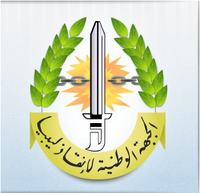
Back الجبهة الوطنية لإنقاذ ليبيا Arabic Nationale Front für die Rettung Libyens German Frente Nacional para la Salvación de Libia Spanish Front de salut national libyen French Barisan Nasional untuk Keselamatan Libya ID Frente Nacional para a Salvação da Líbia Portuguese Национальный фронт спасения Ливии Russian Libya Ulusal Kurtuluş Cephesi Turkish
| National Front for the Salvation of Libya | |
|---|---|
 Seal of the National Front for the Salvation of Libya | |
| Dates of operation | 7 October 1981[1] – 9 May 2012[2] |
| Motives | The end of Muammar Gaddafi's regime and the establishment of a democratic state in Libya |
| Active regions | |
| Status | Defunct; reorganized into the National Front Party |
| National Front for the Salvation of Libya الجبهة الوطنية لإنقاذ ليبيا | |
|---|---|
 Flag of the NFSL. | |
| Dates of operation | 1981 - 2012 |
| Headquarters | Khartum (until 1985) |
| Active regions | Libya Western Europe (1980s) |
| Ideology | Anti-Gaddafism Liberalism Progressivism |
| Allies | Non-states allies |
| Opponents | |
| Battles and wars | Chadian–Libyan conflict Bab al-Azizia mutiny |
The National Front for the Salvation of Libya (NFSL) was a political opposition group active during the rule of the Gaddafi regime in Libya. It was formed in 1981 and called for major liberalising reforms such as democratic elections, a free press, and the separation of powers.[1] During the 1980s, it pursued a campaign of armed opposition to the Gaddafi regime and made several coup attempts, the most notable being its 1984 armed assault on Gaddafi's Bab al-Azizia compound in Tripoli.[3] After the failure of this and several other coup attempts the group largely abandoned militancy, and instead used peaceful tactics to promote reform in Libya; in 2005, the NFSL joined with six other groups to form the National Conference for the Libyan Opposition.[3]
With the fall of the Gaddafi regime in the 2011 Libyan Civil War, the NFSL's main long-term goal was fulfilled. Consequently, after the war's end, the NFSL dissolved itself and was replaced by the National Front Party, which won 3 seats in the 2012 General National Congress election.[4][5] The NFSL's founder and former leader, Mohamed Yousef el-Magariaf was appointed Chairman of the General National Congress, effectively making him interim head of state.[6]
- ^ a b Metz, Helen Chapin, ed. (1987). "LIBYA: a country study, Chapter 4. Government and Politics: Opposition to Qadhafi: Exiled Opposition". Federal Research Division, Library of Congress. Retrieved 20 March 2011.
- ^ Cite error: The named reference
Grantwas invoked but never defined (see the help page). - ^ a b "Who are the real Libyan opposition?". International Business Times. Retrieved 10 August 2012.
- ^ Khan, Umar (30 June 2012). "Party Profile: The National Front". Libya Herald.
- ^ "National Congress party results". Libya Herald. Retrieved 10 August 2012.
- ^ "Gaddafi opponent elected Libya assembly chief". Al Jazeera English. Retrieved 10 August 2012.